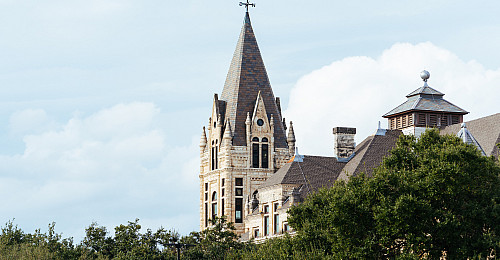Center for Career & Professional Development
Alumna heads to MIT for graduate study in city planning
Open gallery

“For my career plan,” Toro Barragan said, “I’m hoping that this training will put me into an environmental scientist and/or environmental consultant role to help realize environmentally sustainable, resilient, and socially equitable cities. I’m excited!”
Faculty and students at MIT are working on many different projects which interest Toro Barragan, including storm water management grids and climate resiliency projects.
“I am most excited about the creative and collaborate environment that MIT offers,” she noted. “The program is designed to be very flexible and allow you to push against the edges of various disciplines: environmental science, computer science, engineering, architecture, design, anthropology, etc. I’m prepared to be challenged and to explore these intersections creatively and fearlessly.”
Through her studies, Toro Barragan will be able to develop the technical modeling skills needed to look at, interpret, and produce flood risk, storm surge, storm water and municipal water systems models, while incorporating the social justice and public policy skills needed for a systems change.
Her experiences at Southwestern and beyond have tackled climate change at the intersections of science and social justice in various sectors: carbon market research as a student in Costa Rica, Saturdays with Latinx parents cultivating community gardens, organic farming near the Arizona and Texas border, and union organizing with hospital caregivers.
For the last three years, Toro Barragan has been working as a labor organizer for a healthcare workers union, SEIU-UHW, focusing on acquiring problem-solving tools to shift power dynamics within systems of inequalities.
“I mentored groups of leaders through structural and social obstacles, ultimately helping them win their National Labor Relations Board union elections,” she explained. “My most memorable campaign involved an eight-month-long union drive for 1,200 workers at Pomona Valley Medical Center that resulted in a hard-fought victory.”
After being appointed as a Lead Organizer within two years, Toro Barragan found that she yearned to contribute her organizing background more directly to pressing environmental issues by building grass-roots mobilization while creating lasting change at an institutional level.
The impact of Hurricane Harvey on her hometown of Houston and other Gulf Coast communities inspired Toro Barragan to study water management and resources through engineering and city planning
“While intensified coastal storms may strike coastal cities indiscriminately,” she explained, “the full impact of storms and cities’ differing capacity for recovery highlights underlying economic and racial disparities. In particular, I seek to understand how current zoning, local ordinances, and policy in the Houston metropolitan area shape vulnerability and/or resiliency to increased frequency and intensity of storms. I also plan to engage with engineering computational models of storm risk to determine how this technical conversation intersects with social justice in a city as diverse as Houston. My hope is that my experience in mobilizing communities and the professional knowledge of how cities are shaped will lead to more climate resilient communities.”
Toro Barragan credits Southwestern University with providing her opportunities to explore herself academically and personally and encourages current students to do likewise.
“I tried as much as I could to explore my own interests both inside and outside the classroom,” she recalled. “I would challenge you to take classes you thought you wouldn’t be interested in, participate in a professor’s lab and gain early research experience, and join campus organizations that open networks for you. I also encourage you to learn as much from your failures as your successes and to rely on the wonderful network of peers, faculty, and staff during these times.”
Most importantly, Toro Barragan concluded, students should consider traveling abroad.
“Some of my most cherished memories and the direction for my future studies came from my trip to Costa Rica with the School for Field Studies Sustainable Development program,” she said. “Southwestern University has a lot of different ways to find funding for these opportunities, and I took advantage of that! During my program I learned technical skills, such as quantifying carbon sequestration for carbon markets, and when I returned to home, I used a political ecology perspective to question this market strategy for my Environmental Studies honors thesis. (I also ate some of the most delicious food, surfed, hiked, and played soccer with the locals.) My time abroad led to research that utilized an intersectional framework which I still espouse today and built a foundation for my current studies in city planning.”














